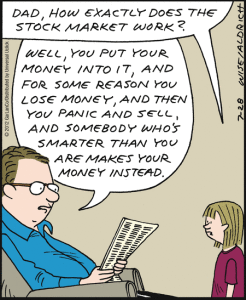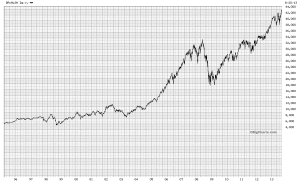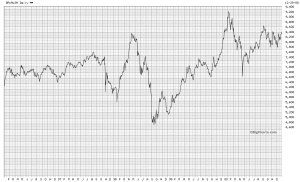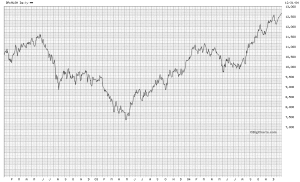Dear Investor Challenge,
Could you help me? My net worth is far too high and I feel like a pack animal dragging my huge wallet around. I need to lighten the load and lose some capital. I don’t really like going to the casino, it’s far too noisy, and if I buy stuff it’ll just clutter up my house. What I’d like to do is get my total worth down using the stock market. I realise this will be very difficult, so at least help me make less than the market average. Do you have any advice?
Sincerely,
Born Winner.
Thanks for writing Mr. Winner. I get letters like this all the time, so don’t feel like you’re the only one who keeps gaining in net worth. You see it’s really difficult losing money on the market. Really, really difficult. Now you already know this Mr Winner, but we have readers wondering why this is the case. They’ve all heard the horror stories about people losing their pensions on the market, of stock brokers jumping out of windows during black Thursday, more people losing everything they have in the dotcom crash, and don’t forget the global financial meltdown of 2008. So how can I say that it’s really difficult to lose money, when so many experts have already done so?
Well that might just be the issue. They’re experts. You see, the stock market always goes up. Stop scratching your head readers, has nobody ever told you that before? Well it’s true. It might not go up today, or next week, it might not even go up this year or for the next two after that, but it will go up. Tirelessly, persistently and tenaciously up. All the record highs we’re seeing at the moment will be beaten. I can guarantee it.
It’ll crash too of course, as it seems to do every now and then. Maybe a small correction, maybe a 2008 style meltdown, but every dip will be recovered from, and given enough time, it’ll even be tough to recognise the crashes.
Take a look at graph 1. This is the all share index, basically the market average for all shares listed on the Johannesburg Stock Exchange (JSE). This is as far back as I could go on the charts, to early 1995 (if you have a longer term graph please let me know!). Looks good doesn’t it? Maybe you’re concerned about that scary bit around 2008, but then let’s look at graph 2.
This one is the same index, but just from 1996 to 2001. Notice that it’s also quite scary when you look at it zoomed to this level, with a similar percentage loss as in ’08, but in the first graph you barely notice it.
And what about graph 3 from 2002 to 2005. Once again scary, again a huge percentage was lost, and again it’s barely noticeable in the longer term.
So how on earth does someone lose money in a market that in 1995 was at an index around 5200ish and is today sitting at 42750? Well since it’s so difficult, you’ll need to strategise. It’ll take some work, preferably by someone who’s market savvy, but with dedication you’ll be able to lose some money too, just like the experts. To make it easier for you, I’ll list the two most successful methods you could follow to lose as much as possible.
Method #1 – How to lose to the market by picking shares
This seems to work best for knowledgable investors. Their thought process is as follows “I’m going to be smart with my investing. I’ll diversify to get enough variety to make things safe, I just won’t pick any shares which will surely go down. No gold shares for me of course, and definitely no Telkom! How hard can it be to avoid the losers.”
If you’ve been watching this competition, you’d see that the gold buyers would have gone down as I predicted, and then recovered their losses, and then some! You’ll even notice some gold investors are now well into the top 10. Telkom who I would never have touched with a 10 foot pole has gained 72% since the competition opened! Clearly I can’t pick shares.
No need to feel sorry for me though, neither can the experts. Figures vary, but close to 80% of professional fund managers lose in comparison to the market average. This is a group of people who’s job it is to understand the market better than anyone else. They have experts at their disposal doing nothing else except researching companies and commodities. 80 hour work weeks sometimes, just to get that little edge over everyone else. The problem is their competitors are doing the same. Also full of experts giving long hours. Ever heard of the law of diminishing returns…
Even so, that leaves 20% who do beat the market in certain years. So why not just pick one of the 20% that are beating the market? Well those same 20% will only beat the market in some years, and quite likely, they’ll lose to it again in other years. The only certain thing is that they’ll charge you a lot of money to try. Also, your chances of picking the right one at the right time is about as good as you predicting the next big share, or which number to bet on on the roulette table. You may get lucky, but probably not. In most cases, the average person would be far smarter for thinking he’s not smart at all. Just buy an index, and accept that you’ll get average returns. Secretly though, you’ll be far smarter than most, because average in this case puts you in the top 20% of investors! Don’t believe me, ask the active fund managers themselves. Two thirds of them invest significant amounts of their own money in passive index funds…
So if you want to lose your money, either try pick a fund manager, or pick a share. It doesn’t even matter if you try pick one that’ll win or lose, you’ll most likely end up losing (relative to the market) in the long run.
Method #2 – How to lose to the market by timing it.
Ok so I’m just a normal guy with a day job. I don’t have 14 hours a day to research companies and I don’t want to try guess it, I’ll just buy the index. But I’m going to be smart, I’ll buy the index when it’s cheap, and if it’s going to drop I’ll sell and buy back when it’s cheaper. 2008 was a good year for this. When the market started dropping some experts thought it wouldn’t drop much further, so they waited, then it did drop further. Some waited some more, others bailed out. It dropped even more and some more bailed out in early 2009, just as it had bottomed out. Since then it’s had years of really good growth, and the guys who sold, had to buy back at higher levels. The trouble is, you never know when you’re at the bottom of a cycle, or at the top.
A few months ago some experts we’re predicting a slow down in quantitative easing, saying a crash was coming and we should sell everything. Well we’re at record highs now, but even if there was a crash, how would we know when to get back in?
Another problem with market timing, is it means you spend too much time in cash. And as everyone should know by now, cash will always lose to inflation. To make cash work for you, you need to get two things right. First you need to predict that a crash is coming and get out when the market is high, then predict that we’re about to start recovering and that market prices are low. There’s more too, when you’re out of the market, you’re not earning any dividends, so by being out of the market you’re not only losing to inflation, you’re also deciding you don’t want any dividends.
And again, please don’t take my word for it, studies have shown that tools used to calculate the market cycles (ie. cyclically-adjusted price-earnings ratio, replacement cost of net assets, even the level of real interest rates) have all earned less than an investor would have by just staying in the market.
Another sweetener, it costs money to climb in and out of the market. The broker I use charges 0.4% for each transaction. So you’d be losing to inflation, losing dividends and losing another 0.8% on top of that. Not sounding like a good enough deal yet. Well wait, there’s more! You see if you hold your stocks you just keep getting wealthier and wealthier without having to give away your money so it can be spent on million rand cattle enclosures. What am I telling you? Well if you hold your stocks, it doesn’t matter how much their value increases, you won’t get to pay a cent in tax unless you decide to sell them.
And boy can you throw a lot of money away on taxes. Since you’re a decent earner and have reached the top tax brackets, selling your shares before you’ve held them for three years will get the hard working folks down at SARS to tax you as a trader. That means all your gains are classed as income, and you’ll get to give away 40% of that! You couldn’t make money dissapear any quicker if you lit it on fire! Even in the best case scenario where you hold your shares for more than three years to be called an investor, still means you’ll be giving away 13.3%.
So where are we now? Ok so we’ve got our cash losing to inflation, we’re tossing away dividends, another 0.8% is going to our broker, and 13.3% or 40% of all the gains is going to SARS. My goodness this must be the most efficient way ever of slimming down a wallet. It’s like 8 minutes abs for you bank account! If you want to be the ultimate loser, just keep trying to guess the market cycles and you’ll be well on your way to reducing your net worth!
Hope that helps Mr. Winner, write back to let us know how much you’ve managed to lose in a few months time.
Feel free to comment in the forum



